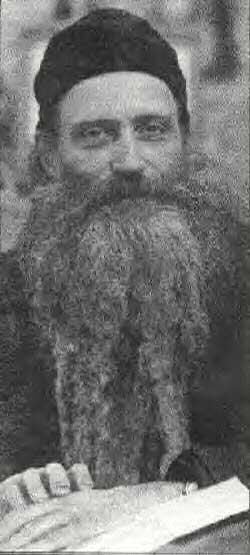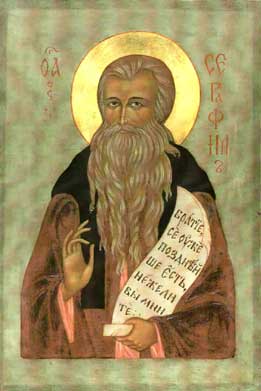|
Home/Blog
Faith
The Orthodox Tradition
News and Politics
About This Site
E-mail Гостевая книга

FATHER SERAPHIM
(Eugene Rose)
A prophetic voice
 orn in 1934 and reposed in 1982, Eugene Rose spent virtually his entire life in his native California, but his conversion from agnosticism to Russian Orthodoxy, his writing and bookselling apostolates and his embrace of the monastic life spread his influence literally worldwide - even to Russia, which he never was able to visit - as a spiritual father for this lost modern age. orn in 1934 and reposed in 1982, Eugene Rose spent virtually his entire life in his native California, but his conversion from agnosticism to Russian Orthodoxy, his writing and bookselling apostolates and his embrace of the monastic life spread his influence literally worldwide - even to Russia, which he never was able to visit - as a spiritual father for this lost modern age.
 After a conversion experience and baptism in a Methodist church at 14, young Eugene later fell away from belief in God. With a keen, penetrating intellect, which took him through Pomona College and graduate studies in Chinese philosophy, even as an unbeliever, Rose saw through the superficiality of secular American culture, even during the supposed ‘golden age’ of the 1950s. After briefly falling in with ‘beatniks’ and dabbling in Buddhism, Rose discovered through the writings of René Guenon and others the need to be grounded in an authentic spiritual tradition. That, the God-given restoration of his faith and his providential first contact with Russian Orthodox in San Francisco led to his reception into the Church through chrismation (confirmation) in the Russian Orthodox Church Outside of Russia (ROCOR) in 1962.
After a conversion experience and baptism in a Methodist church at 14, young Eugene later fell away from belief in God. With a keen, penetrating intellect, which took him through Pomona College and graduate studies in Chinese philosophy, even as an unbeliever, Rose saw through the superficiality of secular American culture, even during the supposed ‘golden age’ of the 1950s. After briefly falling in with ‘beatniks’ and dabbling in Buddhism, Rose discovered through the writings of René Guenon and others the need to be grounded in an authentic spiritual tradition. That, the God-given restoration of his faith and his providential first contact with Russian Orthodox in San Francisco led to his reception into the Church through chrismation (confirmation) in the Russian Orthodox Church Outside of Russia (ROCOR) in 1962.
His bookselling apostolate with his Russian friend Gleb Podmošenskyj - the St Herman of Alaska Brotherhood (now in the Orthodox Church in America and the Serbian Orthodox Church) - led eventually to the decision to head into the northern Californian wilderness to live as monks. Eugene became Fr Seraphim, Gleb Fr Herman.
Like another disillusioned, brilliant modern seeker, Thomas Merton (whose fine autobiography, The Seven-Storey Mountain, Rose thought highly of), Fr Seraphim found peace and solace in the Church and particularly as a monk. But he stayed the course and was not led astray by the cultural upheavals of the late 1960s; indeed, his thorough knowledge of Asian religion and philosophy helped keep him ‘immune’ to it since he already knew its failings when many others were fooled (one famous Church leader went as far as saying ‘the spirit of the times is the voice of God’).
Through his magazine The Orthodox Word and his several books, including Orthodoxy and the Religion of the Future, Fr Seraphim explained modernity and what’s wrong with it, and that the way back is only through Christ and His Church. He shows how the sequential errors of Western thought (rationalism, Renaissance, Reformation, Enlightenment) have led to today’s mess, and dissects various distortions and counterfeits of Christianity such as the charismatic/Pentecostal movement (what Mgr Ronald Knox called ‘enthusiasm’, Fr Seraphim called прелесть - prelest’, a Russian word that here means ‘delusion’) and, more pervasive, secular humanism or ‘Christianity without Christ’. He also discussed the end times, including the coming of the Antichrist (modern society, with its blending together of the religions - part of the great apostasy for Christians - and ‘one world government’ tendencies, is building his throne).
 In The Soul After Death, Fr Seraphim taught the traditional Russian Orthodox pious beliefs about the form of the particular judgement right after death (including the aerial toll houses where sins are assessed).
In so doing he explained phenomena such as the astral plane (New Age)/Bardo plane (Tibetan Buddhism), ‘out of body’ experiences (DON’T try them!), ‘near-death’ experiences - all these are of the same dimension where the particular judgement happens - and even UFOs (he believed the ‘aliens’ are really the demons of the aerial plane in modern guise). In The Soul After Death, Fr Seraphim taught the traditional Russian Orthodox pious beliefs about the form of the particular judgement right after death (including the aerial toll houses where sins are assessed).
In so doing he explained phenomena such as the astral plane (New Age)/Bardo plane (Tibetan Buddhism), ‘out of body’ experiences (DON’T try them!), ‘near-death’ experiences - all these are of the same dimension where the particular judgement happens - and even UFOs (he believed the ‘aliens’ are really the demons of the aerial plane in modern guise).
Fr Seraphim died relatively young in 1982 as a priest and monk in ROCOR.
For a condensed version of all his writings, look through Fr Damascene Christiansen’s 1,000-page biography, Not of This World (now updated and re-released as Father Seraphim Rose: His Life and Works).
One of his manuscripts was published after his death as Nihilism: The Root of the Revolution of the Modern Age.
Note to Roman Catholics: It’s only fair to warn you that as a member of ROCOR, Fr Seraphim held a ‘hardline’ Orthodox view that denied that non-Orthodox sacraments and churches could in themselves have grace and that asserted that Orthodoxy alone is THE Church. Having been forewarned, you still can benefit from reading what he had to say, articulating things about Western churches’ ‘cave-in’ to the spirit of the modern age that you won’t hear from most ‘official’ Roman Catholic sources (you will from traditionalists, however). And Russian belief about the particular judgement (the ‘toll houses’) in no way contradicts Roman Catholicism, which leaves the form of that judgement an open question.
‘Pray without ceasing; it’s later than you think!’
Support this site by buying Fr Seraphim’s books. Click the titles in the text above.
Blessed Hieromonk Seraphim Rose
By Reader Alexis Williams, with two articles by Fr Seraphim and several photos
Audio: On the end of the world
Some words from Fr Damascene
A friend of Fr Seraphim critiques Not of This World
By Fr Alexey Young
A Roman Catholic critiques Not of This World
By William Klimon
Photos of St Herman’s Monastery
Страницы на русском языке
Was Rose homosexual? He might have been, but so what? This article from Pomona College claims he was. If it is true, it takes nothing away from his holiness post-conversion nor from his writings, which never promoted homosexuality. His may well have been a sinner-to-saint story like St Augustine’s Confessions, but he never chose to write an autobiography. The people I’ve talked to who knew him, including Alison Engler (see box at right), who knew him quite well in the 1950s, never said he was homosexual.
| In Memoriam
Alison Engler
Of your charity pray for the repose of the soul of Alison Engler, who died in March 2002, in her 60s, of cancer.  I had the privilege of getting acquainted with her four years before her death. Readers of Not of This World may remember her as Eugene’s friend from Pomona College in the 1950s. A traditional high-church Episcopalian (she ended up in the breakaway ‘Continuing Churches’, and her son-in-law was her priest), towards the end of her life she was good friends with the monks of Platina.
I had the privilege of getting acquainted with her four years before her death. Readers of Not of This World may remember her as Eugene’s friend from Pomona College in the 1950s. A traditional high-church Episcopalian (she ended up in the breakaway ‘Continuing Churches’, and her son-in-law was her priest), towards the end of her life she was good friends with the monks of Platina.
 |
Music: Festive bells, Rostov, Russia
HOME
|